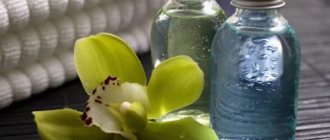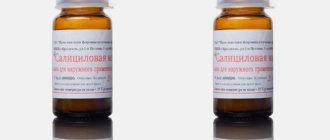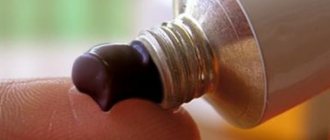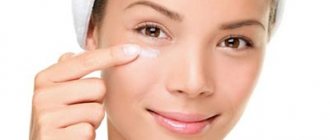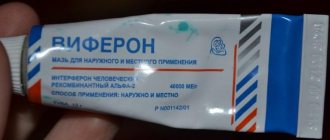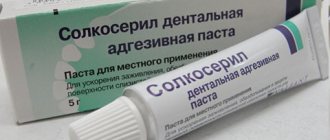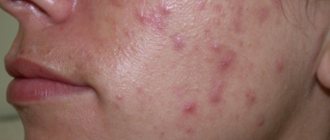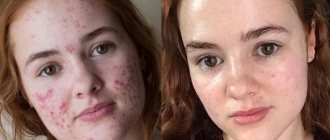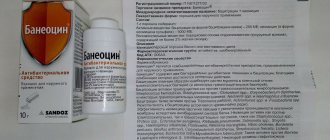I was tired of post-acne and remembered this ointment UPDATED (detailed photos of treatment for 10 days)
Good afternoon, sufferers like me, I sympathize with everyone! From my only review (https://irecommend.ru/content/vo-vremya-priema-na-5.) you can find out where I get such ugly pimples on my genetically pure face ;(.
Well, God bless them, beauty you can't spoil it, don't forget about it.
Pimples break out less, but the spots from them don’t want to leave me, like in the best tragedies about love.
I read a lot of things on IRecommend, and I understood one thing: for these spots you need something that will burn strongly, thereby accelerating skin regeneration! I was very interested in the badyaga, but I haven’t yet chosen days off from work so that my face can “peel off calmly” after it and I’m happy about the absence of this damn post-acne (sorry).
One very useful thought came to me: since heparin ointment resolves bruises, then how can it prevent my spots from bruising!
And it worked! How good it is - see for yourself! I applied it almost every day at night for 10 days (photos are labeled according to the days).
1) this ointment burns great! There will be a red face where you apply it, so I recommend doing this procedure at night!
2) I was very afraid that the ointment would burn my skin (I have dry skin), but no! Not at all! Personally, I don’t even have any peeling from it.
P/S - it doesn’t matter about the manufacturer, but I personally thought that Nizhpharm burned more strongly.
PP/S - now I’m too lazy to write a whole review about ginger for the same problem, but I highly recommend alternating it sometimes with this ointment. Ginger also burns and, as it seemed to me, dries out inflammation. Try it, but be careful, you never know what sensitivity you have, my skin, although dry, is apparently already accustomed to such violence. A, fresh ginger, root, rub on a grater and squeeze out the juice, about 2-3 teaspoons (not the entire face, and on the affected areas). For the night! (redness).
PPP/S - I originally bought this ointment for bumps after injections (Voltaren, Declofinac), and they helped very noticeably, but they did not completely resolve: either I was lazy, did not apply it carefully, or it was not so easy with this ointment from them get rid of.
UPDATE: I'm a lazy person. As soon as I started to see improvements (see photo 12/08/14), I began to apply the ointment very rarely, once a week, or even less often. The fact that now (02/17/15) makes me very happy, the damage is almost invisible! Hurray, I don't have to smear myself with a hated foundation. Girls, I highly recommend it to everyone! I hope it helps.
When treating problem skin, an inexpensive and effective remedy such as Heparin Ointment for Acne is sometimes used. The topical preparation contains substances that relieve the inflammatory process and prevent the appearance of post-acne.
Active components of the ointment
Heparin ointment includes active and auxiliary components. The main active ingredients include:
Heparin is a direct anticoagulant that prevents blood clotting and the formation of clots in blood vessels. The drug helps improve local blood circulation and resolve existing thrombus-like formations on the skin in the form of dark, bluish or red spots after acne. The substance also relieves inflammation and swelling. It is thanks to these properties that the drug is often used for marks left after acne.
Benzocaine acts as a local anesthetic, which is used for painful rashes in the form of immature, subcutaneous pimples, accompanied by itching.
Benzyl nicotinate is a benzyl ester of nicotinic acid, which helps to dilate superficial vessels for better absorption of heparin and helps improve local blood circulation.
The active components of the product do not penetrate the systemic bloodstream, so Heparin ointment for acne on the face is suitable for use by pregnant and lactating women.
The product contains petroleum jelly, stearic acid and glycerin as auxiliary components.
Vaseline has a protective effect on the epidermis, promoting faster healing of wounds that may occur after opening acne. The component also prevents the consequences of acne, but at the same time is not used against scars that have arisen against the background of deep skin lesions due to low efficiency.
List of ointments for subcutaneous acne
It is subcutaneous acne that causes the most discomfort. The main disadvantage is the difficulty in treatment. It is almost impossible to get rid of subcutaneous tissue mechanically. The inflammatory process begins in the depths of the follicle, which is why it is impossible to squeeze out the pus. Special ointments are used to treat internal acne.
- Streptocide
. Broad-spectrum antimicrobial drug. Destroys all streptococcal microorganisms. Quickly relieves inflammation and reduces pain, accelerates the process of pimple maturation. For the treatment of subcutaneous tissue, streptocide can even be used in tablet form. The capsule is crushed and applied as a compress to the affected area; - Heparin
. The principle of action is based on a strong active component - heparoid. Suitable for treating inflamed follicles, redness after shaving in men and hair removal in women. Has pronounced anti-inflammatory and antibacterial properties; - Syntomycin
. This is a powerful extracting substance that gets rid of comedones, red subcutaneous pimples and inflamed acne marks. The product can only be applied to spots, since with extensive use it reduces local immunity; - Calendula ointment
. A simple medical mixture that includes calendula extract and Vaseline. This is a natural antibacterial drug that has a reparative effect. Due to the antimicrobial properties of the plant, the product relieves redness and inflammation. Suitable for local use; - Curiosin
. An analogue of zinc ointment, but the product contains hyaluronic acid as an additional active component. It is used to treat various types of acne, internal pimples, and accelerate tissue regeneration. Helps prevent the formation of scars after squeezing pimples and chicken pox; - Cynovit
and
Skinoren
. Almost identical gels for problem skin. Enriched with extracts of medicinal plants. As auxiliary agents they help with neurodermatitis, fungal diseases, provide anti-inflammatory properties; - Salicylic
and
zinc ointment
.
READ ALSO: A boil on a child’s leg: what does a boil look like in the photo, how to treat it in children?
Effect on the skin
Heparin ointment for acne marks is used due to the following effects on the protective covering:
- improves local blood circulation;
- relieves inflammation and hyperemia;
- resolves dark spots from acne;
- prevents the formation of post-acne marks;
- has a local anesthetic effect;
- increases the protective functions of the epidermis;
- promotes faster healing of wounds after acne.
It should be noted that heparin ointment is effective only against acne spots, but is not able to get rid of scars formed due to deep skin lesions.
Despite its high effectiveness and safety, the local drug has some contraindications and can cause side effects. Therefore, before using heparin for acne, you should study the instructions in detail.
Features of using Heparin ointment for acne
Before using the drug for the first time, if there is a sufficient amount of acne, you should consult your doctor. First, it is recommended to take a blood test for clotting. The medicine should be used immediately if pain, swelling and redness occur.
Getting rid of subcutaneous formations is quite difficult, they cause discomfort. The ointment promotes rapid maturation and healing.
When treating purulent rashes, it is not recommended to use Heparin ointment; anti-inflammatory and antibacterial agents will be more effective. In this case, the drug can cause serious consequences.
During acne treatment, it is recommended to avoid decorative cosmetics, as it can interfere with the healing process.
After acne and pimples, scars, scars and spots often form on the face, and the skin becomes uneven. Sometimes rosacea appears, accompanied by dilation of skin vessels. Heparin ointment helps relieve acne and improve skin condition, normalizes blood circulation and activates the healing process.
How to use ointment for acne
The ointment should be applied to clean and dry skin. For multiple rashes, the substance is distributed in a thin layer over the entire face. In the case of single acne, the product is used directly on the problem area, that is, pointwise. The drug is used not only for the face, but also for other areas affected by inflammation, which most often are the back, buttocks, and chest area.
There are no official instructions for the use of Heparin ointment against acne. Dermatologists recommend using it according to the following scheme:
- Apply spotwise or spread a thin layer over a large problem area.
- Use once a day in the evening after washing.
- Only problem areas should be smeared without affecting healthy tissue.
- Use no more than 1-1.5 weeks.
It is recommended to alternate the drug with other local anti-acne medications that have an antibacterial effect. For example, a bactericidal cream, gel or suspension is applied in the morning, and heparin is applied in the evening.
Mask with heparin ointment for acne
A mask based on the following components will help quickly eliminate stagnant dark spots:
- Heparin ointment – 1 tsp;
- honey – 1 tsp;
- lemon juice – 1 tsp;
- aloe juice – 1 tbsp. l.;
- rolled oats flakes crushed into powder - 1 tsp.
The ingredients are thoroughly mixed, after which the medicinal composition is applied to spots or to the entire face. Exposure time – 15 minutes. If there are purulent rashes, it is not recommended to use the mask. The product is used up to two times a week for 1-2 months.
Possible negative consequences
Complications after using heparin ointment can be mainly in the form of redness, irritation of the dermis, development of dermatitis and urticaria, itching. Disorders of the digestive system may also occur. These may be dyspeptic disorders such as nausea, vomiting, bloating, and stool upset.
How to replace heparin ointment
Stagnant vascular spots will help to effectively remove pharmaceutical products, among which we should highlight such drugs as:
The drug Bodyaga is a cheap remedy that effectively helps against acne spots by improving local blood circulation, eliminating the inflammatory process and exfoliating effect. The product has an effect similar to acid peeling. Bodyaga allows you to even out the complexion of your face and lighten your skin somewhat.
Kelofibraza cream helps prevent the appearance of scars and scars after acne. For formed fibrous type defects, the product is ineffective. In addition to urea, which is the main active component, the drug contains sodium heparin.
Reviews of Heparin ointment for acne
Heparin ointment for acne spots is an effective remedy, as confirmed by user reviews that can be found on thematic forums. The drug allows you to remove stagnant spots from the skin of the face, but at the same time does not eliminate scars and acne scars, which are fibrous tissue. To reduce the manifestations of this type of formation, dermatologists recommend using hardware treatment methods, for example, laser resurfacing or darsonvalization, however, these methods also do not guarantee a 100% result.
Elimination of acne is possible not only with the help of specialized drugs. The experience of a number of people indicates the possibility of using local agents with a broad spectrum of action. Heparin ointment for acne is considered effective due to its ability to inhibit the activity of bacteria and normalize the production of skin secretions.
Benefits of using Heparin ointment for acne
The main advantages of the drug:
- affordable price;
- efficiency;
- versatility.
The product quickly improves the condition of the skin. The face becomes toned and fresh literally after the first use. The ointment is well tolerated, but when applying it you should follow the recommendations and instructions.
Thus, Heparin ointment is an effective remedy for treating acne and inflammation. It reduces scars, scars, spots, improves skin condition after undergoing therapy. Despite all the positive aspects of the drug, it should be used in accordance with the recommendations, as otherwise various side effects may occur.
Compound
Heparin ointment includes a number of useful substances:
- Sodium heparin – prevents the formation of blood clots, eliminates inflammation, increases blood circulation and local metabolism, and protects against scars. In the presence of a strong inflammatory process, it increases the speed of healing due to the activation of the immune system, which occurs due to the flow of blood to its cells;
- Benzyl nicotinate – expands vascular lumens and increases blood circulation, ensuring the penetration of heparin into the body;
- Benzocaine – locally reduces pain.
- Glycerin – due to its ability to absorb moisture, it prevents inflammation, prevents the appearance of wrinkles, and protects the skin from infections;
- Vaseline – forms a protective barrier against germs and bacteria;
- Stearic acid - gives the dermis silkiness and elasticity;
- Peach oil – enriches the skin with vitamins and minerals, moisturizes, removes redness and irritation.
What does the drug consist of?
Heparin ointment is a potent substance that restores blood circulation in the affected area, relieves inflammation, heals the skin, and prevents the appearance of scars. All this happens thanks to the presence of the following components:
- Heparin sodium is a direct (fast) acting anticoagulant. Those. This substance prevents the formation of blood clots and stops the growth of existing blood clots. Sodium heparin also has an anti-inflammatory effect, improves metabolic processes and microcirculation in tissues. The antithrombic effect restores normal blood circulation in the affected area. In case of major inflammatory processes, it accelerates healing due to blood flow to the cells of the immune system.
- Benzocaine works as a local anesthetic, reducing pain.
- Benzyl nicotinate (benzyl ester of nicotinic acid) promotes increased blood circulation in the skin, dilates blood vessels, thereby allowing heparin to be better absorbed inside.
Excipients included in the medicine:
- Vaseline - the advantage of the component is the formation of a protective barrier. By covering the dermis with a thin film, there is no loss of moisture, which protects against the appearance of wrinkles and inflammation (the layer does not allow infections to enter).
- Glycerin – perfectly absorbs (absorbs) moisture from the environment. Wrinkles filled with moisture are smoothed out. The skin is protected from the effects of microbes and various contaminants, wounds are healed and rashes are reduced.
- Stearic acid – the main beneficial property for the skin is the ability to make it smooth and silky, moisturizing and reducing moisture loss.
- Peach oil - contains a large amount of vitamins (A, E, C, B vitamins, iron, calcium, potassium, phosphorus), which makes the dermis more elastic, nourishes it, eliminates dryness and flaking, relieves various types of inflammation and irritation, while not being allergenic.
How does it affect the skin?
Initially, Heparin ointment was developed for the treatment of the following pathologies:
- Inflammatory process in the lymph nodes;
- Thrombophlebitis;
- Phlebeurysm;
- Bruises and injuries;
- Subcutaneous hematomas;
- Superficial mastitis;
- Trophic ulcers.
It will also help treat acne of various forms. The beneficial effect of Heparin ointment for acne is expressed in the following effects:
- Destruction of pathogenic bacteria in pores;
- Reduced swelling;
- Reducing the inflammatory process;
- Pain relief;
- Stimulating tissue regeneration;
- Strengthening local metabolism;
- Strengthening the supply of nutrients to the skin;
- Cleansing cells from toxic substances;
- Resorption of blood clots;
- Expansion of capillaries;
- Normalization of the secretion of sweat and sebaceous glands;
- Disinfection of the epidermis;
- Removing excess fat;
- Evening out facial tone.
Heparin ointment against acne on the face
In dermatology, the drug is used to treat some manifestations of acne. Heparin ointment is indicated for single localized acne and blackheads. It also helps to get rid of large formations on the back and face.
At the initial stage of therapy, a burning sensation and the appearance of reddened areas are likely to occur, which is normal and indicates adaptation to the active substances. Recommendations for increasing efficiency and minimizing negative consequences:
- The ointment sometimes causes an allergic response in the body, so before treating acne with it, it is necessary to conduct an allergy test. The reaction occurs within a few minutes after application to a delicate area of skin. Itching, burning and redness indicate the impossibility of use for therapeutic purposes;
- Before each procedure, preparation is required: wash and remove remnants of decorative cosmetics, dry the dermis and treat with an antiseptic;
- Apply the ointment pointwise to the affected areas, rubbing the composition for 1-2 minutes;
- The frequency of procedures is 2-3 per day. More frequent use has a negative effect;
- The course of treatment is a maximum of 10 days. At the end, you should take a month's break.
Contraindications for the use of ointment
- Do not apply the product more than 3 times a day. This will lead to disruption in the blood system.
- Do not apply in a thick layer, because In case of an overdose, bruises on the skin and a “mesh” of blood vessels may form.
- Do not use on pustules, wounds, scratches, because the product will get inside in large quantities, which is dangerous to health.
- An allergic reaction in the form of severe redness, itching, burning.
- Pregnancy and lactation.
- Blood clotting disorder.
- Decreased platelet count.
Attention! When using the product, to exclude an overdose, we recommend doing the following test: pinch your skin, for example, your hands - if a bruise or spider veins appear, this indicates a decrease in blood clotting. Treatment must be stopped immediately.
Heparin ointment for post-acne (spots, scars, scars)
The inflammatory form of acne has negative consequences in the form of marks, scars, and cicatrices. Eliminating them takes a long time and requires persistence. According to patient reviews and comments from dermatologists, Heparin ointment for acne spots is highly effective in situations where post-acne has appeared within the last year.
The effectiveness of the ointment is due to the presence of sodium heparin in the composition, which promotes accelerated tissue healing and provides the dermis with the necessary nutritional components. Heparin ointment for post-acne is used on the same principle as in the treatment of acne. Required:
- Cleanse the face and then treat with an antiseptic;
- Apply the ointment to areas of spots and acne scars, rubbing it in with massaging movements;
- Apply three times a day;
- The duration of therapy is one and a half weeks.
The effectiveness of scars is increased by avoiding makeup for the period of treatment, as well as by taking a break from using “thick” creams and medications.
Opinions
Judging by the reviews, heparin ointment for acne scars and other skin defects has helped many women. As a result, they got rid of many dermal problems. Some women emphasize that the number of fine wrinkles under their eyes has decreased. As a result, their appearance has significantly improved. According to them, they carried out the procedure within a week.
Patients also note that it was heparin ointment that helped them with inflammatory processes. Therefore, they most often use it in case of various skin defects.
Heparin ointment for subcutaneous acne is a drug that is used not only for its intended purpose, but also in cosmetology. When used correctly, women achieve positive effects.
Contraindications and harm
The use of Heparin ointment is contraindicated for a number of diseases and conditions:
- Chronic hypertension;
- Impaired blood clotting;
- Hypersensitivity to components;
- The presence of purulent inflammations and open wounds.
Under strict medical supervision and with the approval of a medical specialist, treatment with Heparin ointment is possible in the presence of tumors of various origins, during pregnancy, during breastfeeding, and in the presence of pathologies of internal organs.
Compliance with the recommendations for use is very important - otherwise negative reactions from the body are possible:
- Dermatitis;
- Dry skin;
- Peeling, redness, itching.
Moreover, the use of Heparin ointment more than 3 times a day causes disturbances in blood composition, and application in a thick layer provokes rosacea and bruises. Bleeding may occur due to the ability of heparin to thin the blood.
Contraindication
Before using heparin ointment against acne and other skin problems, it is necessary to conduct a sensitivity test, for example, on the wrist. If an undesirable reaction occurs (redness, itching), it is not recommended to use the product.
The main contraindications include:
- individual intolerance to one or more ingredients of the ointment;
- the presence of a blood clotting disorder, which creates a risk of bleeding;
- pregnancy and lactation;
- the presence of open or festering wounds;
- violation of the integrity of the skin.
Vasodilators or blood thinners are prohibited for joint use, as the effect will increase the effects of the main component (heparin).
An important feature of the use of the drug is the need to control platelet levels. This makes it difficult to use the product at home without supervision.
If negative consequences occur, use of the ointment should be discontinued.
